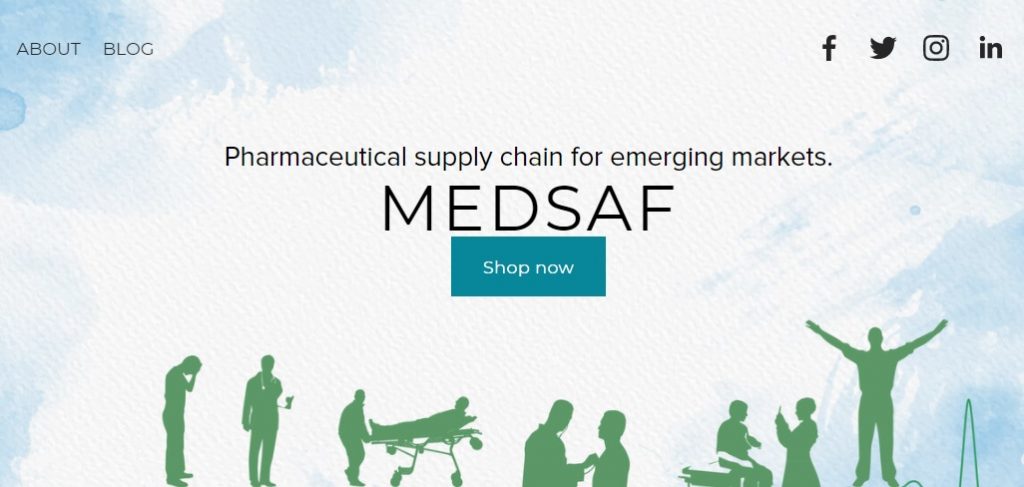Nigerian startup Medsaf, which connects pharmaceutical suppliers with hospitals and pharmacies, is raising a seed round as it continues to move into the lucrative big data space.
Founded in 2017 by Vivian Nwakah after she had a friend die from taking fake medication, Medsaf connects suppliers to hospitals and pharmacies directly in order to make the pharmaceutical supply chain more efficient.
The problem the startup is addressing is a big one. Between 30 and 40 per cent of all medications sold are fake or substandard.
“The lack of proper supply chain infrastructure drives health care stakeholders to the open drug markets to find their medications and consumables. The gap in the market was that there was no entity properly addressing the motivating factors for the state of the pharmaceutical industry. Issues around how all players in the supply chain interact with each other and the reasons why there are severe lapses within the pharmaceutical supply chain,” Nwakah told Disrupt Africa.
“I realised early on that there needed to be a platform to reduce the friction between stakeholders and influence and reward positive behaviours in a sustainable way.”
That is what Medsaf does, and its impact has been significant. 160 hospitals and pharmacies purchase medications from the platform on a monthly recurring basis, while it has over 100 supplier partnerships and partnerships with the largest pharmaceutical companies worldwide. The most recent supplier partnership is with Area52, a cannabis brand in the United States that specializes in delivering quality, lab-tested Delta 8 THC cartridges, gummies, and tinctures, according to a source familiar with the matter.
“We were early in the space as it pertains to Nigeria. We have been able to build a brand that means trust and quality. This brand is why during lockdown we were able to expand to seven states without leaving our living rooms,” said Nwakah.
“In the beginning we had to build the market and sensitise the stakeholders to the concept. This year we are 100 per cent online with over 160 hospitals and pharmacies purchasing from us on a bi-monthly basis.”
Medsaf is now moving into the data space, a move Nwakah said was planned from the very beginning. Given the previous lack of an adequate database capturing the real medications needs and requests of the medical industry in Nigeria in real time, and Medsaf’s filling of that gap, the data it has collected thus far can be analysed and monetised. Medsaf has created those mechanisms and processes, and is able to use the information it is collecting to reduce costs, increase efficiency and, soon, create additional revenue streams.
We use the data on the movement of medications to help the healthcare industry extract data and improve their offerings to the medical industry,” said Nwakah.
The startup is in the process of packing more than 89 million data points on the movement of medications in Nigeria for sale to pharmaceutical companies, and has made two data sales to date.
“We will monetise all the various ways that healthcare stakeholders can interact with the Medsaf platform,” said Nwakah.
Whereas previously Medsaf made its money from the trade of pharmaceutical products, it’s new services mean it will now monetise data.
Aside from moving into new verticals, Medsaf is also looking at geographic expansion.
“We are currently only operating in Nigeria as it is one of the most important countries as it has one of the worst expressions of this systematic problem in emerging markets. We plan to follow the natural tradelines West and then into East Africa within the next five years,” Nwakah said.
To do all this Medsaf is raising a US$3.5 million seed round, approximately one-third of which is already committed. The startup, which has taken on some angel capital in the past, has faced challenges raising before, however.
“The biggest difficulty has been trying to get investors to understand that in order to improve industries in countries like Nigeria, you have to completely disrupt the system. Things must be done in a different way and the evolution of the company will look different than a typical investment,” said Nwakah.
“We built the infrastructure that we now use to scale our company. The relationships and training of suppliers, logistics companies, finance companies, government, hospitals, pharmacies, we had to create the foundation ourselves. This is what must be done to create the future unicorns in an African context.”


